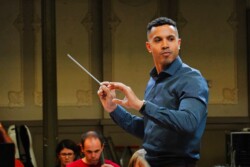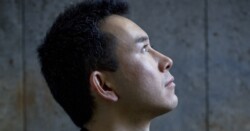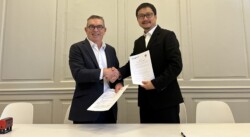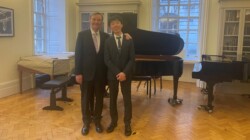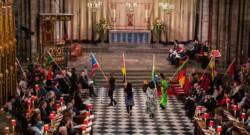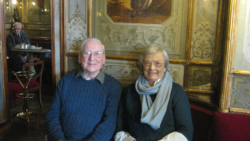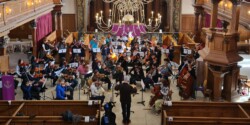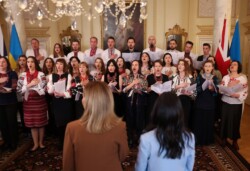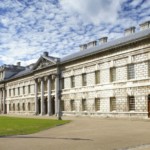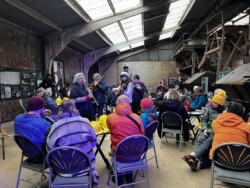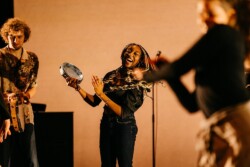This spring, Trinity Laban Symphony Orchestra performed works by Eleanor Alberga and Daniel Kidane, alongside Britten’s orchestral interludes from his best-known opera and a new work by one of Trinity Laban’s talented composition students. The concert, led by emerging conductor Matthew Lynch, forms part of Trinity Laban’s Kaleidoscope initiative, which celebrates the work of Black British composers and musicians.
“Symphony is a loaded word with a long history. It can be programmatic or related to dance. I wrote this symphony because I thought it’s about time I did. It was the perfect opportunity. The title symphony is non-restrictive: it can be a freeing form if one wants it to be.” says composer Eleanor Alberga in the pre-concert talk at Blackheath Halls, in conversation with Dr Emilie Capulet and fellow composer Daniel Kidane. Ahead of the evening performance, the audience gained an exclusive insight into the behind-the-scenes of Eleanor’s Symphony No. 1 Strata and Daniel’s Sun Poem.
Symphony No. 1 Strata was commissioned by the Brandon Hill Chamber Orchestra in memory of David Nash, the orchestra’s principal viola and chairman who died in 2017. It premiered in spring 2022 in Bristol and the co-commissioners, the Meadows Chamber Orchestra, performed the work in Edinburgh a few months later. Named by the BBC as one of the best symphonies by female composers, Symphony No. 1 Strata comprises six movements and revolves around two of David Nash’s interests: geology and sailing. The first movement, ‘Firmament’, is based on the old Hebrew idea of a vast glass dome created by God that divides the ocean into upper and lower sections so that dry land can form. ‘Core’ is the “sonic centre” characterised by “constant vibrations” revolving around the notes F and E and creating a tense atmosphere. The heat and pressure rises to form ‘Mantle’, a movement containing a canon that represents the Earth sending signals in Morse code to the sun to not destroy it. ‘Crust’, ‘Sailing on Tethys’, and ‘Plumes’ complete the second half of the composition: an exploration of the Earth’s surface, a voyage along a pre-historic ocean, and the process of subduction where the ocean’s water bursts through the crust with great energy. “Geology told me where to stop”, explains Eleanor.
When writing, Eleanor uses material that reflects her Jamaican musical heritage, but her Western classical training also plays an important role. Her artistic journey started in Jamaica, where she studied the piano from the age of five, progressing to study music at the Jamaica School of Music. She then attended the Royal Academy of Music, became the company pianist – as well as Music Director – of the London Contemporary Dance Theatre, and launched a career as a world-renowned composer, with works commissioned for the BBC Proms and the Royal Opera. Her compositions consistently make use of the dichotomy between tonality and atonality, a prominent trait of twentieth-century music. “My world was tilted upon introduction to Béla Bartók’s music.” she states. Eleanor equally emphasises that she “draws on so many composers and different ideas” while putting a unique stamp on her music, meaning it never becomes a pastiche of pieces she has previously heard.
Daniel Kidane’s Sun Poem provides a beautiful contrast to Eleanor’s expansive symphony. A profoundly personal piece, it commemorates the journey of fatherhood and two emotional family milestones: the death of Daniel’s father and the arrival of his first child. Co-commissioned by the London Symphony Orchestra and the San Francisco Symphony, Sun Poem premiered at the Edinburgh International Festival in August 2022, conducted by Sir Simon Rattle. The opening trepidation of the woodwind contrasts with reflective string passages, portraying the “nerves and excitement of being a father”. Daniel explains that he found it more difficult to write fast movements when he was younger. However, the challenge was something that enticed him: an energetic, pulsing rhythmical movement thus became his trademark. The inspiration for this piece came from a poem by Kamau Brathwaite, also called Sun Poem, exploring the idea of heritage and paternal lineage. The composition comes full circle, evoking the excitement and turbulence of the journey of fatherhood up until the point that the newborn comes into the world.
Daniel began his musical education at the age of eight when he started playing the violin. He studied composition at the Royal College of Music Junior Department, before studying in St. Petersburg with Sergey Slonimsky and graduating from the Royal Northern College of Music. In 2018, he was appointed Jerwood Composer+, giving him the opportunity to write for and curate a series of concerts with players from the London Symphony Orchestra. He has written music for the likes of the Chineke! Orchestra and the BBC Proms, and is currently a Visiting Tutor in Composition at both the Royal Northern College of Music and Cambridge University.
Trinity Laban student Sam Pugh’s composition À la Baie dé St. Ouën is a prelude for symphony orchestra, written about Jersey’s largest bay. The beach spans almost five miles along the entire west coast of the Island, and across three of Jersey’s twelve parishes; its soft flat sand stretches far into the sea during low tide, contrasted by the surrounding sheer cliffs and sand dunes. Inspired by many visits to St. Ouën’s Bay, and experiencing its vast and expansive landscape across all seasons, Sam kept returning to it as a place of creative inspiration. He therefore sought to create a descriptive piece that depicted the bay in its entirety. Sam’s compositions showcase a unique style, using intricate harmonies and rhythmic complexity, while drawing inspiration from a range of classical, experimental, and electronic music. He continues to push the boundaries of contemporary classical music through his performances and compositions.
À la Baie dé St. Ouën features a recurring motif representing the bay, used to create continuity throughout. The harmony focuses on consonance, gradually evolving in complexity as the piece develops, and the quality of the harmony continuously shifts, much like the slowly changing tides. To further simulate the ebb and flow of the sea, the woodwind swell in and out softly, with support from the brass who gently interject with bell-like tones. A rainstick and suspended cymbal also create a gentle backdrop to the piece, contrasting with the tempestuous timpani and bass drum, who imitate the sound of a far-away storm over the Atlantic Ocean. The strings play a crucial role, serving as the foundation that permeates the entire piece, creating an atmosphere of tranquillity that mirrors the overall calmness of the bay. This is enhanced by the harp, which punctuates changes in harmony and, at the end of the piece, gradually fades away like distant bells. The composition marks the perfect ending to a magical concert by Trinity Laban’s Symphony Orchestra.

